BLANK PAGES: When a culture is stored in memories
Story by Ashley Nerbovig
Photos by Meghan Nolt
THE EIGHT children paid almost no mind to the elderly woman sitting in the classroom. She barely moved, while sitting at the head of the long table with the students. Occasionally she’d focus on an unruly child before looking off back into the distance. The teacher wandered around the room, warning the students several times to be quiet.
When it came time for the children to practice writing their names, the old woman leaned forward to help them form their letters. She could reach the closest two students, while the rest were left to the roaming teacher. She rarely engaged the children beyond that. Her movements were slow, and most of the time she acted only as a surrogate for the teacher, who was overrun by yelling children.
The teacher turned off the lights in the classroom calling for quiet, and Geraldine Doney, 88, reminded the boy sitting closest to her to quiet down, before returning to her role as classroom observer. The boy settled for a moment, but it wasn’t long before he had to be warned again, now by the teacher, to keep still and be quiet. Doney didn’t look at the boy, even though he returned to squirming after only a few minutes. Doney, who has been with the program for 17 years, is one of six foster grandparents working at Fort Belknap Agency’s headstart program.
The foster grandparent program is a national organization with the goal of connecting children to the life experiences of older members of their community. However, watching Doney, it appears her role is closer to that of a teacher’s aide than to an educator.
“The kids seem different than when I first started,” Doney said. “They seemed eager to learn when I first started.”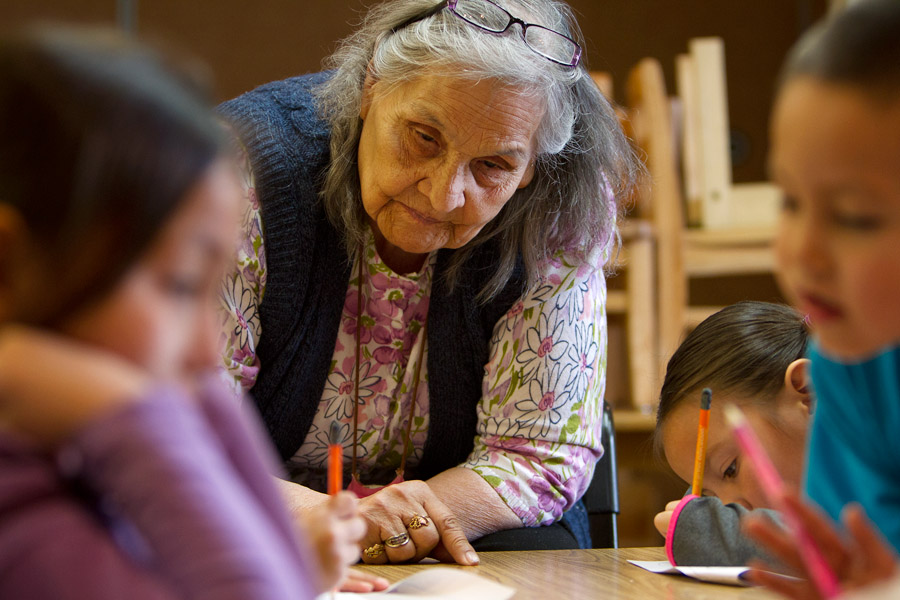
She said she doesn’t relate to the younger generation anymore. Many of them have to be forced to learn to participate in tribal culture; receiving treats or prize money for learning and participating in traditional dances. She said her own upbringing differs too much from the children of today, who she thinks don’t have enough of an elder’s influence in their lives.
Doney said she doesn’t feel like she can share stories with the children like her elders did with her when she was a child. As more people age into the role of “elder,” some believe their culture and way of life is becoming diluted.
However, the Assiniboine and Gros Ventre tribes on the Fort Belknap Indian Reservation are utilizing several programs to introduce the lifelong experiences of elders into class curricula. They hope this will balance students’ contemporary lessons with traditional teachings.
CHERYL MORALES, a professor at the Aaniiih Nakoda College on Fort Belknap, focuses on teaching traditional plant usage and medicinal plant application. Knowledge came from other elders and from reading. She said her mother was one of many Native American parents who never shared very much of her culture.
“My mother, I don’t know what she knew of her culture,” Morales said. “It was so ingrained in her not to teach it, so (her) children didn’t get hurt. I’m trying to learn the plants, but I didn’t learn much from her.”
She said a lot of her knowledge came from her aunt who learned it from Morales’ grandmother.
“There are those gaps where families decided not to hand it down,” Morales said. “This idea that you may still suffer from knowledge.”
Morales said many students were left at boarding schools until they graduated, or until they learned a skill. And those kids’ families lost much of their tradition.
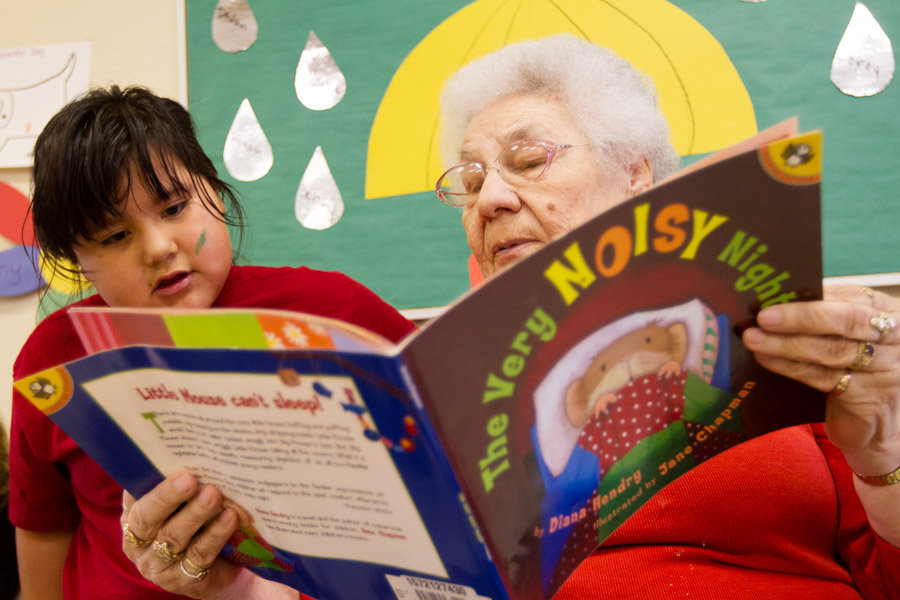 John Allen, executive director of the housing department at Fort Belknap Housing Authority, said these children were lucky if they learned about their traditions at home. The treatment of Native American children at the boarding schools led many parents to hide or disregard their own culture for fear their children would be ridiculed by their teachers. This stereotype perpetuated from the first generation of parents at the boarding schools, leading to several generations of families either practicing their traditions in secret or not at all.
John Allen, executive director of the housing department at Fort Belknap Housing Authority, said these children were lucky if they learned about their traditions at home. The treatment of Native American children at the boarding schools led many parents to hide or disregard their own culture for fear their children would be ridiculed by their teachers. This stereotype perpetuated from the first generation of parents at the boarding schools, leading to several generations of families either practicing their traditions in secret or not at all.
Allen said he was lucky this wasn’t the case for him. His family practiced the tradition of sending the oldest son to live with his grandparents. He used to go with his grandfather and would follow him around learning how to conduct a proper sun dance and powwow.
Doney learned about the sun dances from her grandmother. She remembered seeing scars on her grandmother’s chest where she was pierced and tied to a pole and would dance and bleed for three days to cleanse her spirit.
Doney said she never learned the Assiniboine language, though her mother could speak it fluently. This was partly due to her mother’s lack of time and partly due to Doney being “tongue tied” when she tried to learn. But she got by and learned slowly. However, when she was sent to the local boarding school, the language of her people was finally lost to her.
Doney had only been in the school about a year before one of the nuns hit her for asking a question in Assiniboine.
“I remember my mother asking the nun, ‘You hit that little girl?’” Doney said. “After my mother heard about that, she pulled me out.”
Doney’s experience at the boarding schools is mild compared to some of the treatment students received at schools across the nation. According to a 2007 report, “Native Words, Native Warriors,” from the National Museum for American Indians, the children there “were not only taught to speak English but were punished for speaking their own languages … They were taught that their cultures were inferior.”
In a report drafted by the superintendent of the Fort Belknap boarding school in 1895, the education of the Native American children at the school focused on literature and music. However, the largest section describes manual labor, which was the primary focus at the time.
“Details are carefully made out each month so that during the year each boy receives instruction in all kinds of work incident to a farm and each girl receives instruction in all kinds of housework. At present the school has a garden containing 12 acres. Two boys have been apprenticed as carpenters and two as blacksmiths during the year. The girls have received instruction in all kinds of housework such as cooking, laundry, work of sick and sewing. Many of them are able to cut, fit and make their own clothes.”
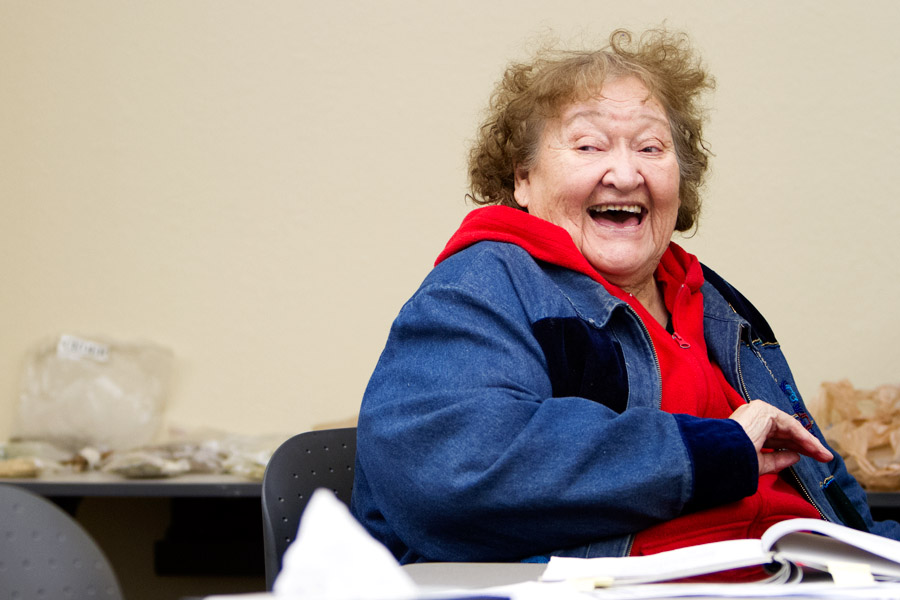 MINERVA ALLEN, 78, is an elder of high standing within the Fort Belknap community and has published several books on the culture of the Assiniboine and Gros Ventre tribes. She occasionally works with the students in Morales’ classroom at the tribal college. During one of those evenings this spring, Minerva set up Ziploc baggies containing plant samples in a corner of the room and handed out packets of information with details on the plants and their different uses.
MINERVA ALLEN, 78, is an elder of high standing within the Fort Belknap community and has published several books on the culture of the Assiniboine and Gros Ventre tribes. She occasionally works with the students in Morales’ classroom at the tribal college. During one of those evenings this spring, Minerva set up Ziploc baggies containing plant samples in a corner of the room and handed out packets of information with details on the plants and their different uses.
Before the class, Morales asked the students to tell her which plants they are growing in the green house on campus. The five students in the class each mentioned one to two plants, naming common things like lavender and peppermint plants, as well as more exotic ones, from marshmallow to yakta to sagebrush.
Minerva is part of a program at the Aaniiih Nakoda College, which brings elders in the community to come teach in the science, technology, engineering and math classes. The program hopes to merge modern education with tribal traditions.
As the students talked, Minerva attempted to set up the television to play a PowerPoint presentation.
“Anyone know how to work that thing?” Minerva asked the class. “How do you turn it on? Or move it? Oh, with the mouse, huh?”
Halfhearted, some of the students attempted to direct her. Others didn’t even look up from the papers in front of them. It wasn’t until Morales returned that the lecture continued.
“All tribes are medicine people,” the elder told the students.
She read directly from sheets she brought to class . As she did, a few students checked their phones. One doodled on a piece of paper, slightly hidden from Minerva’s gaze. However as the lecture continued, Minerva began to lose the monotone professor lecturing voice and started to simply tell stories of when the plants were used in the past.
. As she did, a few students checked their phones. One doodled on a piece of paper, slightly hidden from Minerva’s gaze. However as the lecture continued, Minerva began to lose the monotone professor lecturing voice and started to simply tell stories of when the plants were used in the past.
She told of how gumweed once was used to cure venereal diseases and which plants hunters would use while traveling to cure things like urinary tract infections. The students perked up occasionally at these stories. While no one asked questions, their eyes locked on Minerva, and their hands circled images on their papers, annotating them with details from the stories she told.
Morales said she always tells her students, this is the time to ask the elders these questions. The knowledge is untapped and there for the taking. Morales said she hopes her generation won’t make the mistake of the past one and allow any of the knowledge still living with these elders to go to waste.
“I tell my students that traditional plants were the medicine of our time,” Morales said. “That modern medicine does not have the same properties as the natural plants. Pharmaceutical companies take one active ingredient which targets the disease and leave the one that heals the body. The Indian people know which way is better.”
Morales is disappointed she never had the education directly from her grandmother, but she is glad to provide this opportunity for her students. To give them the chance to learn their culture before yet another generation dies with knowledge still left to be passed down.
SEAN CHANDLER, director of the college’s American Indian Studies department, brought elders into classes with help from the school’s dean. He hopes by bringing in these elders, even students who did not grow up with a strong elder presence in their lives will be able to learn some of the traditions.
In the past, many of the elders were willing to come and speak with the students about how to integrate the elders’ knowledge with modern science. However, the program has also experienced the loss of most of its active elders, including Joe Iron Man, who died in June 2013. Chandler described these deaths as a heavy loss for the tribe.
Chandler listened to elders from a young age and said he learned the language from his grandparents and parents. He said many of the elders he works with come from families who worked hard to preserve their culture.
“They’re good role models, their experience,” Chandler said. Many elders grew up with their grandparents and learned much in the way of natural science. “(They learned) to pick the right plants and preparing foods. They could travel in the dark and look into the stars to find their way home. Sometimes people think that Native people weren’t scientific, in modern terms, but we laid the foundation for a very scientific society.”
Chandler believes the foundation for their college is to bring that knowledge out of the elders and ensure it continues to be taught.
Some of the knowledge was lost in the past, however. He said the elders living today are descended from parents who also attended boarding schools.
“There’s not one reason for this loss,” Chandler said. “The influence of this Euro-American society, the boarding school system broke down a lot of those relationships between elders and their children. It’s all evolved into today. Just the influence of our culture in our local schools, we might figure out a way to make it important again by helping students realize who they really are.”
He has hope. Chandler said the biggest problem he sees is people can’t get the elders to talk about what they know. He said he often starts talking to an elder, and, just by listening, they remember things they thought were long gone.
Chandler said sometimes he doesn’t feel the confidence to carry on all that tradition or that he will be able to carry the culture with him when he becomes an elder. But he also believes it is the same way for every generation, that the current elders must have felt the same way when their elders were dying.
“You have to have a vast amount of knowledge, wisdom, guidance,” Chandler said. “Maybe not all old people could be considered elders, not in the way that they are knowledgeable of the cultural ways, but they’re still an elder.”
GERALD STIFFARM motions from east to west with his forearm. His face is stoic as he gestures it slowly to symbolize the sun’s journey across the sky. The dusty light comes in from his window facing the gravel parking lot with soft Top 40 music coming from his radio.
“The east, the direction the sun comes from, it represents newborn life,” Stiffarm said. He draws a circle on a piece of printer paper, his ballpoint pen scratching out the words “Love” and “Courage” next to animal names and different characteristics of life stages.
“You are not an elder until you have seen your children’s children have a child,” Stiffarm said. “Then you have seen a completion of the four quadrants.”
Stiffarm is of the old mind of elders in the Fort Belknap community. His information was passed down to him from his grandparents and parents but also from research and books. He believes much of the culture of his people was lost during the assimilation of native culture into “white” culture.
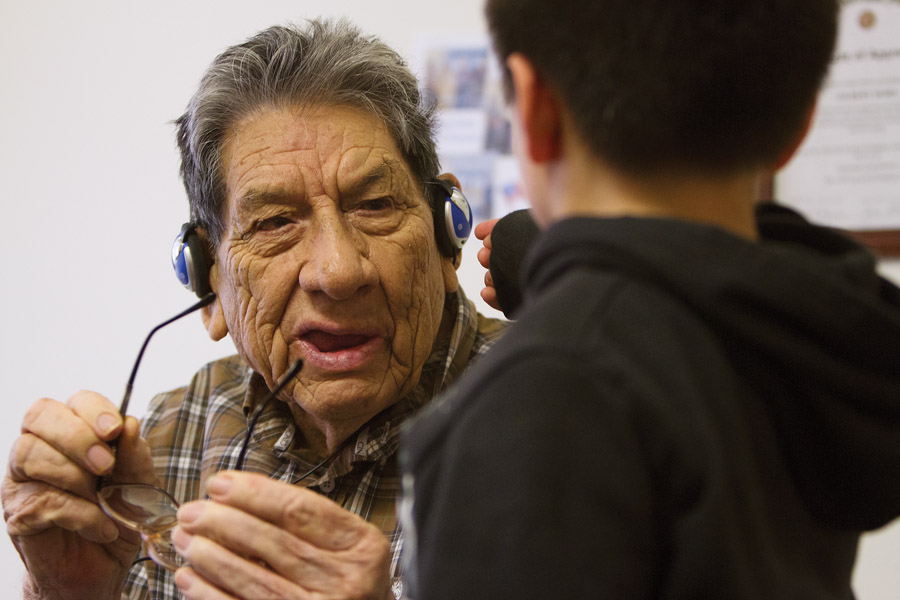 Stiffarm views the elders of the community as people who should still be sought out for information and the backbone of the Fort Belknap community.
Stiffarm views the elders of the community as people who should still be sought out for information and the backbone of the Fort Belknap community.
Doney came from a family with a strong elder presence. She felt connected to her grandparents, often more than her own mother, who she said thrust a lot of responsibility on Doney to be a caretaker in the home, even at a very young age. Because of this, her grandmother became like a mother to her in many ways. Her grandmother lived with her for a short time before she died.
“She would lay on the couch with her blanket up to her neck, and all that you would see is her pipe sticking out of her mouth,” Doney said.
But many things were lost for her, as she was too young for her grandmother to pass on some of the greater traditions.
“Me and some other kids were told not to go down to my grandmother’s house one evening,” Doney said. “But we went down and we were peeking through a window, and there were all these people surrounding this old man. He was chanting, and in front of him was a pipe. As he chanted, the pipe began to tilt up right. We were so scared, we ran away from the window.”
So even though Doney’s grandmother was alive during the time when Fort Belknap’s native culture was rich, Doney doesn’t know the secret to some of the older traditions.
For Doney, her clearest memories of the two of them are sitting together by the creek and enjoying the sounds of the water, just her and her grandmother’s little stove to keep them warm. Doney would sit there for hours as her grandmother puffed on her pipe, occasionally sharing stories with Doney, but mainly they sat in silence together.
“It was just how it was back then,” Doney said. “I just respected her was all. I knew from the time I was little you were supposed to respect your elders. I knew that much.”
- Philomene Hawley, known as “Grandma Tootsie” to the kids, volunteers at the Ramona King Head Start in Hays. The 92-year-old is the longest-serving member in the St. Vincent Healthcare Foster Grandparents Program at 29 years.
- Known as “Grandma Bunny,” Rosemary Peak, right, ties Shaydyn Blount’s shoe at Ramona King Head Start. Blount is the great-granddaughter of Philomene Hawley, center.
- Geraldine Doney helps kids learn how to write their names at Fort Belknap Head Start. Doney is the oldest sister of Rosemary Peak and has been a foster grandparent for 17 years. Doney often gets frustrated with the young kids because she says they lack patience and won’t sit still. “Some of them listen,” she said. “That makes a difference. That’s OK with me.”
- Rosemary Peak enjoys working with the young kids and looks forward to her days at the Head Start program where she often reads books with the kids. Before coming to Head Start, Rosemary Peak volunteered at the high school. One of the reasons she left was because the kids were disrespectful.
- Geraldine Doney helps Gregory Gardipee write his name at Fort Belknap Head Start. As a volunteer, Doney is an extra set of eyes and hands to help teach the kids. She says the kids today aren’t as eager to learn as they were when she started at the school.
- Geraldine Doney sits with kids while they brush their teeth during quiet time. Quiet time starts when the lights go off, but the kids have a hard time sitting still and not talking. Doney and the teachers often have to remind the kids to be quiet.
- Minerva Allen speaks to a class at Aaniiih Nakoda College about the traditional uses and health benefits of various plants. Allen coordinates programs at the senior center in Lodge Pole and is a published author. Her book “Nakoda Sky People” is a compilation of Allen’s poems, Nakoda words and phrases, Native recipes and herbal medicines.
- Gilbert Horn, 90, spends many days sitting on his bed watching TV. His hearing has deteriorated over the years, but he likes watching the moving pictures. Horn moved from his home in Fort Belknap Agency to the Northern Montana Care Center in Havre in February 2013. He was a member of Merrill’s Marauders, a World War II unit known for its mission that penetrated Japan-occupied Burma. He also served as a code talker.
- Lacy Horn hugs her grandfather, Gilbert Horn, 90, after sitting and talking with him. Lacy works at the Northern Montana Care Center and has enjoyed the time she has spent with Gilbert since he moved there in February 2013. She has heard more of his stories in the past year than she had while growing up.
- Antone Rider helps his great-grandfather, Gilbert Horn, 90, remove the headset that helps him hear. Horn moved from his home in Fort Belknap Agency to the Northern Montana Care Center in Havre in February 2013.
- Gilbert Horn, 90, takes a nap in his bedroom at the Northern Montana Care Center in Havre.
 Native News Project 2014 | School of Journalism – University of Montana Native News Project 2014
Native News Project 2014 | School of Journalism – University of Montana Native News Project 2014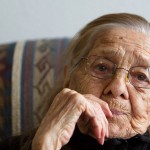
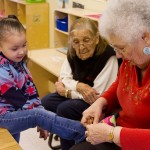
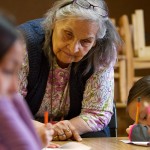
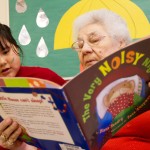
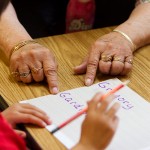
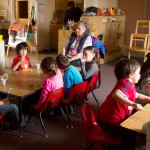
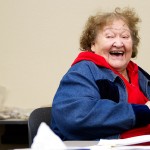
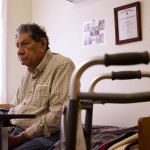
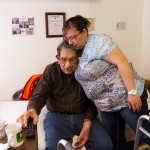
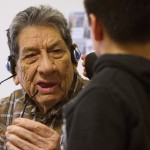
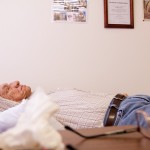


Recent Comments